318 vs. Scotland
previous senior match
(136 days)
328 vs. Wales
previous
match
(24 days)
'U23' 15
vs. France
 329 329
next match
(25 days)
330 vs. Italy
338 vs. Scotland |
 |
Saturday,
11
April 1959
Home International Championship 1958-59
(64th) Match
England 1 Scotland 0
[0-0]
|
.jpg) |
 |
Empire Stadium, Empire Way, Wembley Park,
Wembley, Middlesex
Kick-off (GMT):
3.00pm
Attendance:
98,329;
Receipts: '£49,840';
Walter
Winterbottom's 25th match at the Empire Stadium |
1947.JPG) |
 |
Bobby Charlton kicked-off |
Bobby Evans won the toss |
 |
|
|
[1-0] Bobby Charlton header
59
rose highest to head powerfully downwards from ten yards from a Bryan Douglas
right-sided cross |
|
 |
12.45
Sports Parade 1.10
Records 1.45 Movie Matinee
2.10 Motor Racing 3.0 Racing at Hurst
Park 3.20 Motor Racing
3.45
Football Scotland vs. England
5.0 Sports
Report 6.0 Guitar Club 6.30
Jazz 7.0 Newsreel 7.24
Football |
|
second half live on the Radio Light Programme
- Commentator: Raymond Glendenning |
|
|
|
|
|
|
|
|
|
 flg.jpg) "ENGLAND
NEED CLOUGH" Daily Mirror "ENGLAND
NEED CLOUGH" Daily Mirror |
 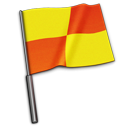 Officials
from Portugal Officials
from Portugal |
England |
UK ruling on substitutes |
Scotland |
Referee
(red)
Joaquim Fernandes
Campos
34
(5 September 1924), Lisboa, |
Teams presented to the Guest
of Honour, Prime Minister, The Right Honourable Harold Macmillan MP.
THE FACTS as reported in the Daily News...
Shots—by
England 26, by Scotland 13. Corners—to England 12, to Scotland
3.
Goal-kicks—by England 8, by Scotland 17. Off-side—England 5, by Scotland 3.
Fouls—by England
17, by Scotland 6. - Once more, the ball was lemon yellow.
|
|
flame flag
Linesmen
orange flag |
Hermínio Henrique Soares
43 (23 May 1915), Lisboa |
Eduardo Rosa
Gouveia
44 (28 April 1914), Lisboa |
|
|
|
flg.jpg) England
Team England
Team |
| |
|
Rank |
No official ranking system established;
ELO rating 4th |
Colours |
The 1959 Bukta
home uniform -
White v-necked short-sleeved continental jerseys, black shorts, red
socks with white calf hoop. |
|
P first of 38, W 1 - D 0 - L 0 - F 1 - A 0. |
|
Captain |
Billy Wright
|
Manager |
Walter Winterbottom, 46 (31 March 1913), appointed as FA national director of coaching/team manager on 8 July 1946; |
|
rec. 85th of 90, W 48 - D 20 - L 17 - F 212 - A 121. |
Trainer: Harold Shepherdson |
P 103rd of 139,
W 61 - D 24 - L 18 - F 286 - A 142,
one abandoned. |
|
|
 ³ ³ |
|
Team chosen by Selection Committee, headed by Joe Mears, on
Sunday, 5 April. |
flg.jpg) England
Lineup England
Lineup |
|
|
four changes
to the previous match (McDonald,
Clapton, Lofthouse & A'Court out) |
league position
(5 April) |
|
|
|
Hopkinson, Edward |
23
164 days |
29 October 1935 |
G |
Bolton Wanderers FC (FL
8th) |
7 |
9ᵍᵃ |
|
2 |
Howe, Donald |
23
181 days |
12 October 1935 |
RB |
West Bromwich Albion FC (FL
7th) |
15 |
0 |
|
3 |
Shaw, Graham L. |
24
276 days |
9 July 1934 |
LB |
Sheffield United FC
(FL2 5th) |
3 |
0 |
|
4 |
Clayton, Ronald |
24
249 days |
5 August 1934 |
RHB |
Blackburn Rovers FC (FL
9th) |
25 |
0 |
|
5 |
Wright, William A. |
35
64 days |
6 February 1924 |
CHB |
Wolverhampton
Wanderers FC
(FL TOP) |
100 |
3 |
|
most apps
1952-59 |
|
6 |
Flowers, Ronald |
24
257 days |
28 July 1934 |
LHB |
Wolverhampton
Wanderers FC
(FL TOP) |
3 |
0 |
7
 |
Douglas, Bryan |
24
319 days |
27 May 1934 |
OR |
Blackburn Rovers FC (FL
9th) |
12 |
1 |
|
8 |
Broadbent, Peter F. |
25
331 days |
15 May 1933 |
IR |
Wolverhampton
Wanderers FC
(FL TOP) |
4 |
2 |
9
 |
Charlton, Robert |
21
182 days |
11 October 1937 |
CF |
Manchester United FC (FL 2nd) |
7 |
7 |
|
10 |
Haynes, John N. |
24
176 days |
17 October 1934 |
IL |
Fulham FC
(FL2 2nd) |
27 |
12 |
|
776 |
11 |
Holden, A. Douglas |
28
195 days |
28 September 1930 |
OL |
Bolton Wanderers FC (FL
8th) |
1 |
0 |
|
the 23rd Wanderer to
represent England |
|
reserve: |
Joe Shaw (Sheffield United FC
(FL2 5th)) |
|
pre-match notes: |
The party trained at Stamford Bridge on Tuesday, 7th, beating Chelsea
FC in a practice match 2-1 (Broadbent and Haynes scoring for England,
and Don Howe lobbing his own goalkeeper for Chelsea).
On Wednesday
8th, England again had a practice match, at Arsenal Stadium in
Highbury and beat the host team 4-0 (Broadbent scoring twice, Douglas
and Holden the other two). Bobby Charlton followed up the session with
a penalty-kick practice between himself and Eddie Hopkinson.
The
team finalised their training and tactics at the Bank of
England Sports Ground in Roehampton on the Thursday. |
|
team notes: |
Colin McDonald broke his leg in the Football League vs. Irish League
fixture, 17 March 1959.
The intention of the International
Selection Committee this time round was to name the same team to play
in the next five England international matches. |
|
appearance
records: |
Captain Billy Wright continues to break records as he becomes the
first England player to reach one hundred appearances, extending his
own record tally, in his record 65th consecutive match.
The fact
that Billy Wright becomes the first player in the world to reach one
hundred appearances for his country is all the more astonishing by the
numbers of his colleagues. Only Tom Finney's 76 comes close, followed
by Jimmy Dickinson's 48 and Stan Matthews' 37.
Johnny Haynes
becomes the tenth player under Winterbottom/ISC/post-war to have made
27-or-more appearances.
Doug Holden is the 125th player to
represent England under Winterbottom. |
|
records: |
First time that England have kept two clean sheets in a row at the
Empire Stadium.
Bobby Charlton is the 25th different England player
to score more than once against Scotland. |
|
|
|
2-3-5 |
Hopkinson -
Howe, Shaw -
Clayton, Wright, Flowers -
Douglas, Broadbent, Charlton, Haynes, Holden. |
|
Averages: |
Age |
25 years 219 days |
Appearances/Goals |
18.5 |
2.2 |
|
England teams v. Scotland: |
|
1958: |
Hopkinson |
Howe |
Langley |
Clayton |
Wright |
Slater |
Douglas |
Charlton |
Kevan |
Haynes |
Finney |
|
1959: |
Shaw |
Flowers |
Broadbent |
Charlton |
Holden |
|
|
|
 Scotland
Team Scotland
Team |
| |
|
Rank |
No official ranking system established;
ELO rating 19th |
Colours |
Made by Umbro -
blue continental jerseys with white v-neck collars/cuffs,
white shorts, blue socks with red tops. |
Captain |
Bobby Evans |
Manager |
Andrew Beattie,
45 (11 August 1913), second spell in charge, reappointed as part-time manager on 20 March 1959.
current manager of Carlisle United FC, England. |
|
Trainer: Dawson Walker (Clyde FC) |
first
match, W 0 - D 0 - L 1 - F 0 - A 1; Overall, 7th match, W 2 - D 1 - L
4 - F 6 - A 15. |
|
Team chosen by Selection Committee, with Beattie in attendance, on
Wednesday, 1 April. |
 Scotland
Lineup Scotland
Lineup |
|
|
Brown, William D.F. |
28
185 days |
8 October 1930 |
G |
Dundee FC |
4 |
5ᵍᵃ |
|
736 |
2 |
MacKay, Duncan |
21
271 days |
14 July 1937 |
RB |
The Celtic FC |
1 |
0 |
|
3 |
Caldow, Eric |
24
332 days |
14 May 1934 |
LB |
Rangers FC |
16 |
0 |
|
4 |
Docherty, Thomas H. |
30
352 days |
24 April 1928 |
RHB |
Arsenal FC, England |
25 |
1 |
|
final app 1951-59 |
|
5 |
Evans, Robert |
31
269 days |
16 July 1927 |
CHB |
The Celtic FC |
38 |
0 |
|
6 |
Mackay, David C. |
24
148 days |
14 November 1934 |
LHB |
Tottenham Hotspur FC, England |
5 |
0 |
|
7 |
Leggat, Graham |
24
295 days |
20 June 1934 |
OR |
Fulham FC, England |
10 |
3 |
|
8 |
Collins, Robert Y. |
28
54 days |
16 February 1931 |
IR |
Everton FC, England |
25 |
9 |
|
9 |
Herd, David G. |
24
361 days |
15 April 1934 |
CF |
Arsenal FC, England |
3 |
1 |
|
737 |
10 |
Dick, John |
29
23 days |
19 March 1930 |
IL |
West Ham United FC, England |
1 |
0 |
|
only app 1959 |
|
11 |
Ormond, William E. |
32
47 days |
23 February 1927 |
OL |
Hibernian FC |
6 |
2 |
|
final app 1954-59 |
|
reserves: |
Travelling reserve is Andy Kerr (Partick Thistle FC).
Full team of reserves are
George Farm (Blackpool FC); John Grant (Hibernian FC) and Hugh Baird (Partick Thistle
FC); Jack Cumming (Heart of
Midlothian FC), Jackie Plenderleith (Hibernian FC) and Bert McCann
(Motherwell FC); Alex Scott (Rangers
FC) and John White (Falkirk FC); Andy Kerr; Bobby Collins and Graham Leggat. |
|
pre-match notes: |
On Tuesday, 8th, after the party travelled overnight, the Scotland
team trained in Donning, Berkshire.
The Scotland team beat Reading FC 2-1 (Dick & Collins, Wheeler
replied) in a full-scale practice match at Elm Park on 9 April. |
|
team notes: |
Dave Mackay, a recent £30,000 capture for Tottenham,
'recovered from a boil and swelling of
the groin' in time to train and participate in Reading. |
|
|
|
2-3-5 |
Brown -
Dn MacKay, Caldow -
Docherty,
Evans, Dv Mackay -
Leggat, Collins, Herd, Dick,
Ormond |
|
Averages:s |
Age |
27 years 148
days |
Appearances/Goals |
11.8 |
1.4 |
|
|
|
|
Match Report
by Mike Payne |
|
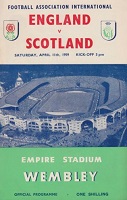 THE
magnificent Billy Wright led England out against the Auld Enemy in what
was an appropriate fixture to gain his 100th international cap. The packed
Wembley fans stood as one to give the England captain a tumultuous welcome
on what was a very special day for him. The Wolverhampton Wanderers player
had been a tremendous ambassador for both club and country, and there was
rarely been a more deserving honour in the history of the THE
magnificent Billy Wright led England out against the Auld Enemy in what
was an appropriate fixture to gain his 100th international cap. The packed
Wembley fans stood as one to give the England captain a tumultuous welcome
on what was a very special day for him. The Wolverhampton Wanderers player
had been a tremendous ambassador for both club and country, and there was
rarely been a more deserving honour in the history of the
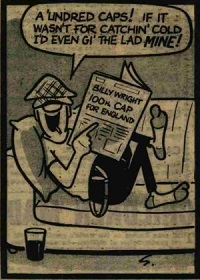 game. game.
The
match was always going to play second fiddle to Wright's achievement, but
as it happened it turned out to be a close and well-contested affair.
Scotland, with Evans and Brown in sparkling form, held on for an hour,
withstanding some fierce England pressure. The first half saw Peter
Broadbent and Bobby Charlton showing some lovely skills with Charlton's
power shooting once more to the fore.
On 20 minutes, a fine move involving Johnny
Haynes and Charlton saw the Manchester United man hit a tremendous long
pass out to the impressive Doug Holden on the left wing. It split the
Scottish defence wide open but when Holden's cross found Broadbent on the
six yard line, Brown charged from his line to brilliantly smother the
danger.
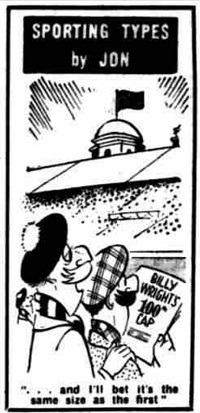
During the first half it became
apparent that England manager Walter Winterbottom was using a new plan.
Instead of a big bustling centre-forward of old, he was now putting
Charlton in the middle, instructing him to take on a roving role
alternating with the other two inside-men, Haynes and Broadbent. It worked
well and failed only in the respect of goals. Meanwhile, in defence,
Wright and Ronnie Clayton snuffed out the Scottish threat by giving
Collins and Dick no room to manoeuvre.
After the interval Charlton
was again the main thorn in Scotland's side and on the hour, England
finally gained the breakthrough they richly deserved, scoring a goal which
was fit to win any match.
Clayton found Broadbent down the right
and he, in turn, cleverly sent Bryan Douglas away. The winger sent over a
long, tantalising cross and Charlton, roaring in, met it with an
unstoppable downward header. His momentum carried him into a forward roll
and Brown,
this time, had no chance to save.
.jpg) Brown saved his side
shortly afterwards following another Charlton special. Holden, showing
some lovely touches on the left wing, put the number-nine through.
Charlton ghosted past two blue shirts as though they weren't there, before
hitting a tremendous right-footer, knee-high. At the last second, Brown
leapt across the goal brilliantly to turn the ball aside. It was a super
save and Brown, alone at times, denied England their deserved bigger
victory margin. Brown saved his side
shortly afterwards following another Charlton special. Holden, showing
some lovely touches on the left wing, put the number-nine through.
Charlton ghosted past two blue shirts as though they weren't there, before
hitting a tremendous right-footer, knee-high. At the last second, Brown
leapt across the goal brilliantly to turn the ball aside. It was a super
save and Brown, alone at times, denied England their deserved bigger
victory margin.
Wright, Clayton and the other defender kept Herd
and Dick totally in check and Scotland had only one real chance to score.
That came 12 minutes from the end and exposed Eddie Hopkinson's lack of
inches. The goalkeeper failed to gather Docherty's deep cross and when the
ball ran loose. Herd was left with a free shot at an empty goal.
Unfortunately for him and for Scotland the ball struck Leggatt and was
eventually cleared.
It would have been unfair on England had
Scotland equalised but, having said that, if a team does not emphasise in
superiority with goals, then they leave themselves wide open to that sort
of thing happening.
To be fair, had Brown not been in such splendid
form the victory would have been far more clear cut, but if Brown was
Scotland's hero, then Charlton was undoubtedly England's. Superbly backed
up by Broadbent and Haynes, this trio made sure that Wright had a double
celebration at the end of the day.
|
|
Match Report
by Norman Giller |
|
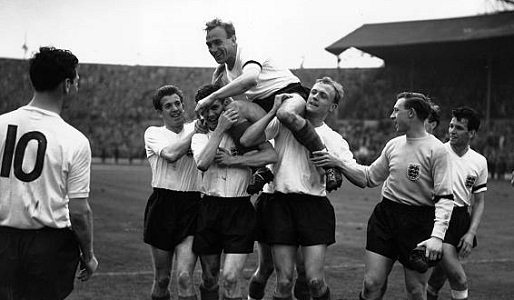 An historic day for
Billy Wright when he became the first footballer in the world to win one
hundred international caps. A closely fought game was won for England by
an acrobatic header from Bobby Charlton after Bryan Douglas had sent over
a precise centre in the sixty-second minute. At the final whistle, the
England skipper was carried shoulder high to the Wembley dressing-room by
his team-mates Don Howe and Ronnie Clayton. Johnny Haynes collected a
painful memento of Billy's historic match when a fierce tackle by Dave
Mackay left him with a broken little finger on his left hand, and Bryan
Douglas limped through much of the game with damaged knee ligaments.
Bolton winger Doug Holden won the first of his five caps, and played with
pace and fire against a Scottish defence in no mood to concede an inch.
Dundee goalkeeper Bill Brown was the man of the match, denying Bobby
Charlton a hat-trick of goals with magnificent saves. It was a performance
that convinced Tottenham manager Bill Nicholson that he should sign Brown
for Spurs, and he became a key man in their double year of 1960-61.
Carried in triumph the length of the Wembley pitch at the final whistle,
Billy Wright was given the sort of ovation reserved only for true sporting
gods.
His
wife Joy, of Beverley Sisters fame, had given birth to their first daughter,
Victoria, just six days earlier and had been allowed out of hospital to watch
the game. The Scots did their best to spoil the party by playing their hearts
out, but Bobby Charlton scored yet another crackerjack goal to underline that
he was a young genius at the game. An historic day for
Billy Wright when he became the first footballer in the world to win one
hundred international caps. A closely fought game was won for England by
an acrobatic header from Bobby Charlton after Bryan Douglas had sent over
a precise centre in the sixty-second minute. At the final whistle, the
England skipper was carried shoulder high to the Wembley dressing-room by
his team-mates Don Howe and Ronnie Clayton. Johnny Haynes collected a
painful memento of Billy's historic match when a fierce tackle by Dave
Mackay left him with a broken little finger on his left hand, and Bryan
Douglas limped through much of the game with damaged knee ligaments.
Bolton winger Doug Holden won the first of his five caps, and played with
pace and fire against a Scottish defence in no mood to concede an inch.
Dundee goalkeeper Bill Brown was the man of the match, denying Bobby
Charlton a hat-trick of goals with magnificent saves. It was a performance
that convinced Tottenham manager Bill Nicholson that he should sign Brown
for Spurs, and he became a key man in their double year of 1960-61.
Carried in triumph the length of the Wembley pitch at the final whistle,
Billy Wright was given the sort of ovation reserved only for true sporting
gods.
His
wife Joy, of Beverley Sisters fame, had given birth to their first daughter,
Victoria, just six days earlier and had been allowed out of hospital to watch
the game. The Scots did their best to spoil the party by playing their hearts
out, but Bobby Charlton scored yet another crackerjack goal to underline that
he was a young genius at the game.
|
|
Match Report
by Glen Isherwood |
|
Victory for Scotland would have given them their first outright
British Championship since 1951 when they had last beaten England. The
home side had drawn their previous two games and had to win to secure a
record eighth successive title. Like England, Scotland had been knocked
out of the previous year's World Cup in the first round but the Scots had
finished bottom of their group.
The only goal came after almost an hour's play. A high cross from
Douglas was met by Bobby Charlton who directed a superb header past Brown.
Apart from this it was a poor match to celebrate Billy Wright's 100th cap.
Northern Ireland's 4-1 win over Wales at Windsor Park gave them a share of
the Championship for the third time in four years. After gaining a share
themselves the following year, Scotland were back at Wembley in 1961 for a
game that they would never forget.
|
|
Match Report
as appears in the F.A. Yearbook 1959-60 page
34 |
|
Though the score makes the match look
close, England were in fact superior to their opponents in all matters
except shooting. The England selectors returned to the inside trio of
Broadbent-Charlton-Haynes, and were rewarded by a fine display accurate
passing and inter-changing of positions which completely baffled the
Scottish defence. Douglas and Holden, making his début on the left wing,
were also impressive, and it appeared that goals would come at any moment.
Fine play by Evans and Brown, allied to the poor finishing, kept the
margin to the one goal scored after an hour's play; the opening was made
by Clayton and Broadbent, carried on by Douglas, whose cross was headed
acrobatically home by Charlton. He was again the star closely followed by
Haynes, Clayton, and Wright, who was playing in his hundredth
International. The Scottish forwards disappointed and, except for Evans,
their defence was also unimpressive.
|
|
CAP NO.100
by Billy Wright: A Hero For All Seasons, pages 191-192 |
|
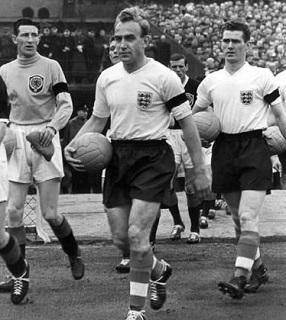 The greatest day of my England career.
Everything went to perfection, and it was particularly special to be able
to pick out Joy and her twin sisters Teddie and Babs in the crowd as I led
the team n the pitch. Joy had given birth to our first daughter, Victoria,
just six days earlier and 'Mum' had been allowed out of hospital to watch
the game. The Scots did their best to spoil my party by playing their
hearts out, as they always do at Wembley. But my team-mates were
determined to mark the occasion with a victory. Bobby Charlton scored yet
another crackerjack goal to underline that he was a young genius at the
game. I was snowed under with thousands of telegrams and congratulatory
messages, and the celebrations went on for days. Legendary German team
manager Sepp Herberger came over to London specially to present me with a
giant silver candlestick on behalf of the West German FA, and at a civic
reception in Wolverhampton I was given a silver rose bowl by the Mayor and
another one by the Wolves supporters, From the Football Association I
received a magnificent silver salver emblazoned with flags of all the
countries I had played in, and the Irish FA presented me with a beautiful
collection of Waterford crystal. The National Sporting Club threw a dinner
for me, and gave me a huge cocktail cabine, and then - the greatest honour
of them all - I was invited to Buckingham Palace for a private lunch with
the Queen and the Duke of Edinburgh. As I looked around the Palace dining
room I could not quite believe that all this was happening to a lad from
Ironbridge. And I owed it all to the great game of football. The greatest day of my England career.
Everything went to perfection, and it was particularly special to be able
to pick out Joy and her twin sisters Teddie and Babs in the crowd as I led
the team n the pitch. Joy had given birth to our first daughter, Victoria,
just six days earlier and 'Mum' had been allowed out of hospital to watch
the game. The Scots did their best to spoil my party by playing their
hearts out, as they always do at Wembley. But my team-mates were
determined to mark the occasion with a victory. Bobby Charlton scored yet
another crackerjack goal to underline that he was a young genius at the
game. I was snowed under with thousands of telegrams and congratulatory
messages, and the celebrations went on for days. Legendary German team
manager Sepp Herberger came over to London specially to present me with a
giant silver candlestick on behalf of the West German FA, and at a civic
reception in Wolverhampton I was given a silver rose bowl by the Mayor and
another one by the Wolves supporters, From the Football Association I
received a magnificent silver salver emblazoned with flags of all the
countries I had played in, and the Irish FA presented me with a beautiful
collection of Waterford crystal. The National Sporting Club threw a dinner
for me, and gave me a huge cocktail cabine, and then - the greatest honour
of them all - I was invited to Buckingham Palace for a private lunch with
the Queen and the Duke of Edinburgh. As I looked around the Palace dining
room I could not quite believe that all this was happening to a lad from
Ironbridge. And I owed it all to the great game of football.
|
In
Other News....
|
It was on 12 April 1959
that United States Secretary of State, 71-year-old John
Dulles was rushed back to Washington from Florida for
further cancer treatment following an x-ray during his
convalescence. He resigned from office, three days later,
and died, six weeks later. |
|
|
|
|
|
|
Source
Notes |
TheFA.com
Original newspaper reports
The Complete Book of the British Charts
LondonHearts.com
Alberto Helder blogspot |
|
Rothman's Yearbooks
Mike Payne's England: The Complete Post-War Record
Norman Giller, Football Author
Drew Herbertson, Scottish FA historian
British Pathé |
|
|
cg |
.jpg)
1947.JPG)



.jpg) Brown saved his side
shortly afterwards following another Charlton special. Holden, showing
some lovely touches on the left wing, put the number-nine through.
Charlton ghosted past two blue shirts as though they weren't there, before
hitting a tremendous right-footer, knee-high. At the last second, Brown
leapt across the goal brilliantly to turn the ball aside. It was a super
save and Brown, alone at times, denied England their deserved bigger
victory margin.
Brown saved his side
shortly afterwards following another Charlton special. Holden, showing
some lovely touches on the left wing, put the number-nine through.
Charlton ghosted past two blue shirts as though they weren't there, before
hitting a tremendous right-footer, knee-high. At the last second, Brown
leapt across the goal brilliantly to turn the ball aside. It was a super
save and Brown, alone at times, denied England their deserved bigger
victory margin. An historic day for
Billy Wright when he became the first footballer in the world to win one
hundred international caps. A closely fought game was won for England by
an acrobatic header from Bobby Charlton after Bryan Douglas had sent over
a precise centre in the sixty-second minute. At the final whistle, the
England skipper was carried shoulder high to the Wembley dressing-room by
his team-mates Don Howe and Ronnie Clayton. Johnny Haynes collected a
painful memento of Billy's historic match when a fierce tackle by Dave
Mackay left him with a broken little finger on his left hand, and Bryan
Douglas limped through much of the game with damaged knee ligaments.
Bolton winger Doug Holden won the first of his five caps, and played with
pace and fire against a Scottish defence in no mood to concede an inch.
Dundee goalkeeper Bill Brown was the man of the match, denying Bobby
Charlton a hat-trick of goals with magnificent saves. It was a performance
that convinced Tottenham manager Bill Nicholson that he should sign Brown
for Spurs, and he became a key man in their double year of 1960-61.
Carried in triumph the length of the Wembley pitch at the final whistle,
Billy Wright was given the sort of ovation reserved only for true sporting
gods.
An historic day for
Billy Wright when he became the first footballer in the world to win one
hundred international caps. A closely fought game was won for England by
an acrobatic header from Bobby Charlton after Bryan Douglas had sent over
a precise centre in the sixty-second minute. At the final whistle, the
England skipper was carried shoulder high to the Wembley dressing-room by
his team-mates Don Howe and Ronnie Clayton. Johnny Haynes collected a
painful memento of Billy's historic match when a fierce tackle by Dave
Mackay left him with a broken little finger on his left hand, and Bryan
Douglas limped through much of the game with damaged knee ligaments.
Bolton winger Doug Holden won the first of his five caps, and played with
pace and fire against a Scottish defence in no mood to concede an inch.
Dundee goalkeeper Bill Brown was the man of the match, denying Bobby
Charlton a hat-trick of goals with magnificent saves. It was a performance
that convinced Tottenham manager Bill Nicholson that he should sign Brown
for Spurs, and he became a key man in their double year of 1960-61.
Carried in triumph the length of the Wembley pitch at the final whistle,
Billy Wright was given the sort of ovation reserved only for true sporting
gods. The greatest day of my England career.
Everything went to perfection, and it was particularly special to be able
to pick out Joy and her twin sisters Teddie and Babs in the crowd as I led
the team n the pitch. Joy had given birth to our first daughter, Victoria,
just six days earlier and 'Mum' had been allowed out of hospital to watch
the game. The Scots did their best to spoil my party by playing their
hearts out, as they always do at Wembley. But my team-mates were
determined to mark the occasion with a victory. Bobby Charlton scored yet
another crackerjack goal to underline that he was a young genius at the
game. I was snowed under with thousands of telegrams and congratulatory
messages, and the celebrations went on for days. Legendary German team
manager Sepp Herberger came over to London specially to present me with a
giant silver candlestick on behalf of the West German FA, and at a civic
reception in Wolverhampton I was given a silver rose bowl by the Mayor and
another one by the Wolves supporters, From the Football Association I
received a magnificent silver salver emblazoned with flags of all the
countries I had played in, and the Irish FA presented me with a beautiful
collection of Waterford crystal. The National Sporting Club threw a dinner
for me, and gave me a huge cocktail cabine, and then - the greatest honour
of them all - I was invited to Buckingham Palace for a private lunch with
the Queen and the Duke of Edinburgh. As I looked around the Palace dining
room I could not quite believe that all this was happening to a lad from
Ironbridge. And I owed it all to the great game of football.
The greatest day of my England career.
Everything went to perfection, and it was particularly special to be able
to pick out Joy and her twin sisters Teddie and Babs in the crowd as I led
the team n the pitch. Joy had given birth to our first daughter, Victoria,
just six days earlier and 'Mum' had been allowed out of hospital to watch
the game. The Scots did their best to spoil my party by playing their
hearts out, as they always do at Wembley. But my team-mates were
determined to mark the occasion with a victory. Bobby Charlton scored yet
another crackerjack goal to underline that he was a young genius at the
game. I was snowed under with thousands of telegrams and congratulatory
messages, and the celebrations went on for days. Legendary German team
manager Sepp Herberger came over to London specially to present me with a
giant silver candlestick on behalf of the West German FA, and at a civic
reception in Wolverhampton I was given a silver rose bowl by the Mayor and
another one by the Wolves supporters, From the Football Association I
received a magnificent silver salver emblazoned with flags of all the
countries I had played in, and the Irish FA presented me with a beautiful
collection of Waterford crystal. The National Sporting Club threw a dinner
for me, and gave me a huge cocktail cabine, and then - the greatest honour
of them all - I was invited to Buckingham Palace for a private lunch with
the Queen and the Duke of Edinburgh. As I looked around the Palace dining
room I could not quite believe that all this was happening to a lad from
Ironbridge. And I owed it all to the great game of football.